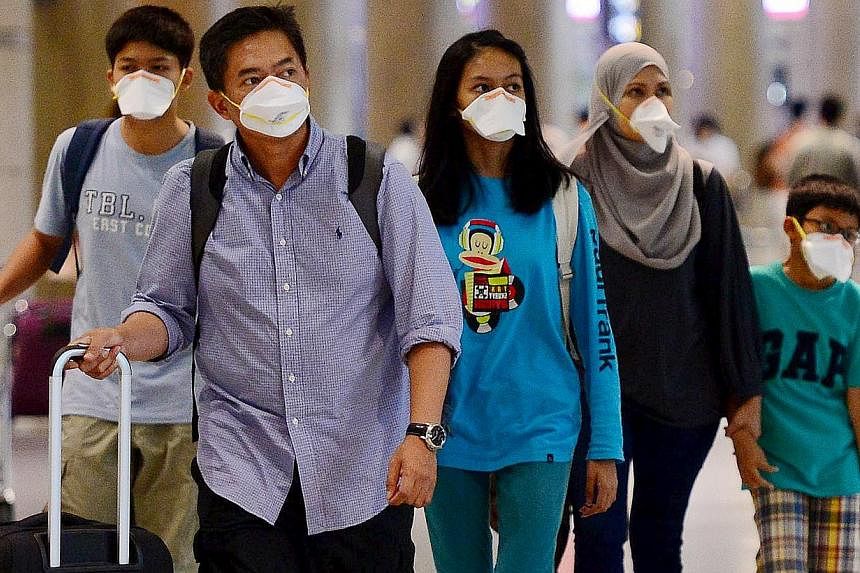SEOUL (THE KOREA HERALD/ASIA NEWS NETWORK) - The South Korean government is facing criticism for failing to pay due attention to the concerns of foreign residents here over the Middle East Respiratory Syndrome (Mers).
Puzzled by baseless rumours about the virus, expats have complained of a dearth of foreign-language information about the Mers situation, and how to avoid contact and whom to refer to for any anti-infection support.
Critics argue that the government's lack of efforts to address expats' concerns contradicts the government's mantra of becoming a global, foreigner-friendly country, and its diplomatic efforts to promote trust in East Asia on non-traditional security challenges including transnational diseases.
"The (Korean) government hasn't done anything to help foreigners. I haven't seen any official English-language material (about Mers)," said English teacher Christopher Cashel Cordo from the United States, stressing that the only official message he got from Korean authorities was in Korean.
"I think the government, in general, needs a taskforce or single public figure to offer frequent updates and information about the spread of the virus for the foreign population here," he added, noting that he had "no faith" in the Park Geun Hye administration with respect to his well-being.
As of April, there were over 1.4 million foreign residents registered in Korea.
Mers-related information on the English website of Seoul's Health Ministry was left largely neglected, while the Korean version of the website was updated minutes after the ministry's daily briefing at 11am.
Since the first Mers case was confirmed on May 20, the ministry has not posted any information about the virus in English or any other language until May 27.
On May 28, it posted a press release about the first confirmed patient and the containment efforts. Since then, there had been no updates until June 10.
The Korean "Hotline" for consultations on Mers was established on Monday. The idea to provide the service in English did not surface until recently, with the service starting at 9am this Friday, coinciding with a timeframe pinpointed by the government officials as a turning point for Mers to start subsiding.
The Korea Herald tried to contact the ministry for comments, but no official was available.
The Korean government's lack of attention to Mers fears among foreigners has also been a source of frustration for many foreign diplomatic missions.
They received an official government briefing about Mers at Seoul's Foreign Ministry on Monday, nearly 20 days after the first Mers case was confirmed.
"The threat of the virus was underestimated by the hospital in the initial stages. The Korean government had to get involved more actively as a result," George Khabelashvili, minister counsellor of the Georgian Embassy, told The Korea Herald.
"Foreign service workers need to have full access to a wide range of information at any given moment because we need to inform our own citizens about ongoing situations in the country they are serving in."
Conflicting information from different South Korean public entities has further confused foreign embassy staff here, Ignacio Lacunza, deputy head of mission at the Argentine Embassy in Seoul pointed out.
Fears about Mers were tangible among migrant workers, who have to work long hours without sufficient access to information.
"The workers go to work early in the morning and come back home at midnight. They have no time to access information through media though they are fluent in English," said Shekh Al Mamun from Bangladesh, senior vice president of Migrants' Trade Union.
"The Labour Ministry has a list of names and addresses of foreign residents. So why doesn't it ask the migrants' trade unions or factories to inform the foreigners? … It seems like the government does not care about us and has no plans to alleviate fears among foreigners."
The Korean government's failure to address foreign nationals' concerns has called into question Seoul's move to improve its international status and promote regional cooperation on non-political issues including transnational diseases and disaster relief.
"Control of diseases such as Mers is the representative topic in the realm of non-traditional security cooperation. Seoul has called for cooperation in that area," said Kim Tae Hyun, an international politics professor at Chung-Ang University.
"But the lack of attention (to foreign residents) seems to indicate that the Korean government is retrogressing from the global trend of close cooperation on handling transnational diseases."


